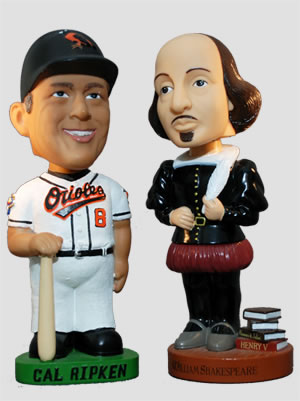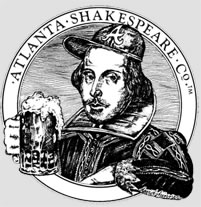Shakespeare and Baseball
Beware the Tides of October
Shakespeare was a sports fan. Aside from his many references to the warrior sports (fencing, archery, hunting, birding, capturing butterflies and pulling off their wings), he often mentions recreational sports, too. The Dauphin's sending Henry V a trunk of tennis balls may be historical, but Shakespeare also suggests in Hamlet that Laertes likes to play tennis. The merry men of Windsor discuss dog racing. Dromio of Ephesus in The Comedy of Errors likens himself to a football being kicked back and forth by Antipholus and Adriana.
Even baseball gets a Shakespearean shout-out. In Henry VI, Part One, Mortimer compares death to a player or manager being tossed from a game for arguing a call too arduously: “But now, the arbitrator of despairs, just death, kind umpire of men's miseries, with sweet enlargement doth dismiss me hence.”
 Surely, Shakespeare didn't see, or foresee, baseball. Though it descended from bat and ball games dating to Cleopatra's times, the game we know today as baseball took its present form in New York City in the 1840s. So, while I'm not claiming that Shakespeare was (or even would be today) a baseball fan, I do assert that baseball is the most Shakespearean of sports.
Surely, Shakespeare didn't see, or foresee, baseball. Though it descended from bat and ball games dating to Cleopatra's times, the game we know today as baseball took its present form in New York City in the 1840s. So, while I'm not claiming that Shakespeare was (or even would be today) a baseball fan, I do assert that baseball is the most Shakespearean of sports.
A ball game is life-mirroring theater, either for tragedy (your team loses), comedy (your team wins), history (your team clinches), pastoral (a day game), pastoral-comical (where the sun bedevils the outfielders), historical-pastoral (in Yankee Stadium), tragical-historical (no-hit by the Red Sox), tragical-comical-historical-pastoral (The 1959 Pirates' Harvey Haddix pitching 12 perfect innings only to lose in the 13th inning thanks to an error). “Fickle fortune” rests not only on the heroic abilities of the characters but also on the choices they make, along with the whims of the gods (i.e., umpires) or fate (a ball hit one inch to the left or right, higher or lower, can change the outcome of an entire 162-game season). A batter may be intentionally plunked by a pitcher and so awarded first base, reach third on a subsequent single, and then steal home against that pitcher: “and thus the whirligig of time brings in his revenges.” Baseball's scenes, like Shakespeare's, are dictated not by the clock but by the action, and the action abides by a set formula that could be called “the unities”—three strikes, three outs, nine innings—but all with certain exceptions.
Other sports can make similar claims, but more than any other sport, the outcome of a ballgame is always in play from start to finish. Therein lies the essence of its dramatic quality. Baseball also is the sport with aspirations that most emulate our own workaday lives. Achieving three of every ten of your goals is Hall of Fame worthy. Suffering two bad days in each week will still amass a winning record of historic proportions. That should give all of us hope in our own lifelong contests.
I come at this conclusion not as a baseball elitist, but as a journalist who started his career as a sports writer covering football, baseball, basketball, hockey, and track and field. In fact, football (American style) was my first love as a teenager: I studied National Football League teams during the preseason; I created my own fantasy league. Meantime, I was learning the nuances of baseball from our high school coach as I covered the team for the local paper. About the same time, I was getting my first exposure to theater in general and Shakespeare in particular. Hmmmm.
From that time I've loved both baseball and Shakespeare in equal measure, and my wife Sarah shares in both. Our home has a room (we appropriately call it—and painted it—the “Green Room”) devoted to our baseball and Shakespeare libraries, artwork, and memorabilia. We have season subscriptions to three local Shakespeare theaters, and we have season tickets to the Washington Nationals. Nevertheless, I never much thought about the two being two sides of the same passion coin until Sarah and I attended a recent, typically nail-biting Nationals game when, in conversation, I compared it to watching Hamlet. It may be a tragedy in the end, but we enjoy the three hours' traffic leading up to the conclusion. Even in the loss (of the game, of the sweet prince), we feel somehow emotionally and intellectually richer by the whole experience.
Aside from the ubiquitous drama inherent in both theater and baseball, Shakespeare has a number of noteworthy parallels with the sport. When teams commit several fielding and throwing gaffes on a single play, broadcasters like to call the moment “a comedy of errors.” And Love's Labour's Lost ends with the same hopeful lament that served as the perennial cry of Brooklyn Dodgers' fans in the 1950s: “Wait 'till next year.”
The Pittsburgh Pirates are kind of like Romeo and Juliet. They've got some great characters (McCutchen/Mercutio) and start off each year hot and full of passion, but after the All-Star break comes a sequence of missteps and fateful turns that result in their concluding the season in great solemnity and wondering about all the “if only”s that could have altered their destiny. To continue by the method, the Kansas City Royals are like The Two Gentlemen of Verona: an inept comedy, incomprehensible in its execution.
We could make a parlor game of matching great baseball characters to Shakespeare's dramatis personae, and I'll spot you Casey Stengel as baseball's Dogberry and Derek Jeter as the Duke in Measure for Measure. Speaking of a duke, how about baseball's “surly Earl,” as in Weaver, the Hall of Fame manager of the glory-year Baltimore Orioles? He was, truly, a student of Shakespeare (even so, he was more of a Hotspur than a Hal).
The melancholia-ending comedy of Twelfth Night is like losing Game Seven of the World Series in extra innings, especially if your team had no expectation of making it that far (“or What You Will”). Such was the case with the 1991 Atlanta Braves. Living near Atlanta at the time, I had adopted the Braves as my team—being an Air Force brat and spouse, I never had an affixed home team, so my geographical affinity transferred from Detroit to the Phillies to the Braves and now to the Nationals based on where I happened to be living. My King Lear moment in baseball came in the 11th inning of that '91 Series' Game Six when Braves manager Bobby Cox called on Charlie Liebrandt to pitch to Minnesota's Kirby Puckett: “Howl! Howl! Howl!” I cried as Puckett's homerun ended the game and set up the epochal Game Seven which the Braves would lose.
This is all silliness, perhaps—and, admittedly, I'm using this forum to vent my baseball emotions in the tensions of a pennant race involving the Nationals. Nevertheless, the intellectual, psychological, and emotional parallels between experiencing baseball and Shakespeare bear serious consideration. “The game drips with intangibles,” Tampa Bay Rays Manager Joe Maddon was recently quoted as saying. So does Shakespeare.
Consider all the dimensions of this seemingly simple play in baseball: a foul fly ball down the outfield line. If a fielder catches it for an out, that would seem to conclude that the batter failed and the fielder succeeded. Vice versa, if the fielder drops the ball, he's a goat and the batter is lucky. Neither is the case, however, if a runner is at third with less than two outs. Once the outfielder catches the ball, even in foul territory, the runner could tag up and score; the outfielder needs to consider whether it's wiser to catch the ball or let it drop, and all the circumstances of the game at that very moment go into that decision. And this is a simple play. I could eat up bandwidth talking about wheel plays, hit and runs, run and hits, delayed steals.
Shakespeare, thanks to his brilliant use of metaphor and imagery, accomplishes the same multilayered effects in his lines. These two words, “Come night,” combine to create at least four meanings, and which meaning comes to the fore depends on how Juliet speaks them amid the context of her play-long portrayal and the nature of her “knight,” Romeo. Layer in the fact that she is saying these two words in a speech of ecstatic anticipation while we, the audience, know that catastrophe has already befallen her “knight,” and these two simple words become laced with the dramatic complexity of a late inning pop foul. I could eat up bandwidth talking about Hamlet's soliloquies, the Macbeths' meditations, Falstaff's quips.
Shakespeare's and baseball's characters, even though they have, respectively, a script to follow or statistically defined categorical qualities, deliver multidimensional nuances as well. Hamlet: Is he mad? Is he mad in craft? Was he already mad before even seeing the ghost? Is he mad and then comes to his senses by his near-England experience? Is he a young man teetering on the edge of mental illness and totally aware of that fact? I've seen Hamlet played all these ways, and all were somehow right according to the context and circumstances of the production. Ryan Zimmerman: Is he a free-swinger? Is he a contact hitter? Is he a power hitter? Is he a situational batter? Does he have an expansive strike zone that tightens when the game is on the line? He is all of these, sometimes in the same game, depending on the circumstances and the particular pitcher he's facing.
Watching almost any other sport, I know enough to accurately predict how most plays will unfold. On the other hand, I know more about baseball and have seen perhaps a thousand games, but I can only guess what's going to happen on the next pitch, and I'll have a one-in-a-hundred chance of being right. This year at a Nationals game, the opposing team had runners on first and second with no outs, and the batter attempted a sacrifice bunt. He popped the ball up—easy out, yay! But the Nats fielders let the ball fall harmlessly to the ground—stupid error, oh no! But because the runners couldn't run on a caught pop-up and so had to wait until the ball hit the ground before taking off for their next base, the first baseman picked up the ball and threw to third to start a double play—two outs, holy cow! The whole play was orchestrated by the first baseman, who called off the pitcher from catching the bunted ball in the air and then let it drop, an “orchestration” that was a split-second in the forming; Iago at his most devious is not that quick. Furthermore, in those six or so seconds we experienced an emotional yo-yo, the crowd literally shifting from cheers (popped up bunt) to jeers (dropped ball) to exaltation (double play); King Lear goes from danger to hope to the deepest of despair within six lines.
Even more amazing to me is that while I've seen a thousand baseball games, that was the first time I have ever seen such a play.  I've seen 16 productions of Twelfth Night on stage plus two on film; that's 18 different Violas, Olivias, Malvolios, Festes, Tobys, Aguecheeks, Sebastians, and 19 different Orsinos (we saw one production twice with an understudy filling in at one performance), and every production surprised me somehow. Even on the page, if you read Twelfth Night this week and again next week, you'll feel you've read two different plays as Shakespeare's script melds to your mood of the moment and your experiences up to that moment. This is true of every one of his plays, even Two Gents.
I've seen 16 productions of Twelfth Night on stage plus two on film; that's 18 different Violas, Olivias, Malvolios, Festes, Tobys, Aguecheeks, Sebastians, and 19 different Orsinos (we saw one production twice with an understudy filling in at one performance), and every production surprised me somehow. Even on the page, if you read Twelfth Night this week and again next week, you'll feel you've read two different plays as Shakespeare's script melds to your mood of the moment and your experiences up to that moment. This is true of every one of his plays, even Two Gents.
Certainly, other sports can make similar or, at least, contrary claims. So can other literary masters and theatrical arts. However, this is me on the psychoanalyst's couch, and to me, nobody wrote in a richer vein or is staged so often and so disparately as Shakespeare, and no sport “drips with intangibles”—and tangibles, too—or offers as much emotional and intellectual drama as baseball. So, when it comes to one or the other, do we have a true preference or do we merely flip that passion's coin? Neither. Just as my favorite theater logo, the Atlanta Shakespeare Company's rendition of Shakespeare wearing an Atlanta Braves cap (above), so perfectly combines our two passions, we give each their maximum due. This season, we've given up a couple of Nationals games to attend plays, but we're scheduling no theater during October, baseball's postseason. Life is like Shakespeare and baseball: It is something ever new to be experienced in its specific place and time.
Eric Minton
September 26, 2012
Reader response:
I enjoyed your commentary very much. To compare Shakespeare with baseball takes expertise in both area, which you have. More power to you!!!!
Dean Minton
September 27, 2012
Yep, that's my dad. But aside from the fact that this is his first time directly responding in writing to one of my essays, I'm presenting his comment as an opportunity for me to point out that I inherited my love of both Shakespeare and baseball from my parents. Growing up I knew that my father always loved baseball, and my mother became a devoted fan of the Detroit Tigers when we were stationed in Michigan. I have a million or more fond childhood memories, but one of those was when we were visiting my grandparents in North Wilkesboro, N.C., and dad and I went out to the car in the driveway one evening and picked up Detroit's WJR on the car radio and listened to a Tigers game together. When I was in college, mom and dad were stationed in England, and on my visits there they always packed in as many plays as they could. It was then I learned that dad had a lifelong love of Shakespeare, fired by a college professor who claimed to have frequent conversations with the Bard. If not for those Michigan baseball days, the passion that went into the writing of this essay would never have taken seed, and if not for those theater trips in England, the passion that created this website would never have taken root. That power in me started with them.
EM
Comment: e-mail [email protected]
Start a discussion in the Bardroom



 Find additional Shakespeareances
Find additional Shakespeareances